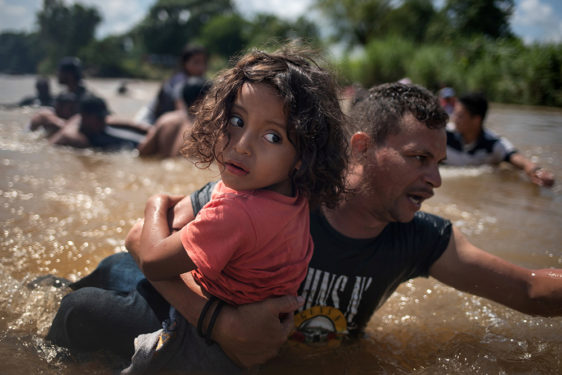
By Christopher White, The Tablet’s National Correspondent
As President Donald Trump prepares to send 5,200 troops to Mexican border to block some 4,000 Central American asylum-seekers, Catholic leaders are urging governments to address the underlying causes of migration while reminding people that seeking asylum is not a crime.
A caravan now estimated at 7,000 people is currently making its way north. Many of the asylum-seekers have said they plan to stay in Mexico – where President Enrique Peña Niet has pledged medical support and temporary work permits – but an estimated 4,000 intend to continue the trek up to the U.S. border.
A joint statement on Monday from the heads of the major Catholic migration and relief agencies in the United States urged compassion and a commitment to seeking “humane solutions that honor the rule of law and respect the dignity of human life.”
“As Catholic agencies assisting poor and vulnerable migrants in the United States and around the world, we are deeply saddened by the violence, injustice, and deteriorating economic conditions forcing many people to flee their homes in Central America,” wrote Bishop Joe Vásquez, Chairman of the U.S. Conference of Catholic Bishops’ Committee on Migration; Sean Callahan, President and CEO of Catholic Relief Services (CRS); and Sister Donna Markham, President and CEO of Catholic Charities USA.
“While nations have the right to protect their borders, this right comes with responsibilities. Governments must enforce laws proportionately, treat all people humanely, and provide due process,” they continued.
“We affirm that seeking asylum is not a crime. We urge all governments to abide by international law and existing domestic laws that protect those seeking safe haven, and to ensure that all those who are returned to their home country are protected and repatriated safely,” they said.
Meanwhile, on the ground, Catholic agencies and parishes are among the primary sources of aid and relief to the band of migrants that left Honduras earlier this month.
A report in The Guardian cited full capacity at the local Catholic parish in the Guatemalan border town of Tecún Umán, where the eventual asylum-seekers took refuge and were given food.
In an interview with The Tablet, Rick Jones, who is the youth and migration advisor of CRS and based in El Salvador, said the agency actively working to provide humanitarian assistance to the caravan – but he also observed that they are looking at the broader social challenges faced by locals.
“Beyond responding to the migration caravan, for decades CRS has been helping tens of thousands of people in Guatemala, El Salvador and Honduras, through vocational training and related economic support,” he told The Tablet.
“International aid is working but you can’t undo in two years social problems that took 50 years to create. If we stop trying to build stability and create opportunities in Central America now, we’re sending a message that there is no hope. The caravan is merely a symbol of these deeply-rooted regional problems that call for solutions and, even more importantly, hope,” he said.
On Monday, Mexico City Cardinal Carlos Aguiar Retes told The Tablet he was confused about the current situation.
“I’m certainly surprised by this caravan. I wonder why they’re doing it, because they don’t want to go into the United States, they just want to make a demonstration at the border,” he said. “It’s a bit strange because it seems that there are many who’ve already returned. Then, at the beginning they were only from Honduras, but now I’ve read they’re mostly from Guatemala.”
Meanwhile, the bishops’ conference of Honduras released a statement last week lamenting the conditions forcing Honduran citizens to leave the country.
“It is a shocking reality caused by the current situation in our country, which forces a multitude to leave what little it has, venturing without any certainty for the migration route to the United States, with the desire to reach the promised land, the ‘American dream,’ which allows them to solve their economic problems and improve living conditions for them and their families and, in many cases, to ensure long-awaited physical security,” they wrote.
“It is the duty of the Honduran state to provide its citizens with the means to satisfy their basic needs, such as decent, stable and well-paid work, health, education and housing, and when these conditions do not exist, people are forced to live in tragedy and many of them hope to undertake a path that leads to development and improvement, finding themselves in the shameful and painful need to leave their families, their friends, their community, their culture, their environment and their land,” they continued.
Deaf To The Cries
The bishops pleaded with the government to remedy the situation immediately.
“We were deaf to the cries of their rights and blind to see that reality,” they lamented.
In the United States, Trump’s critics have charged he’s politicizing the situation and that his plans to deploy such a high volume of troops is unjustifiable.
Border Bishop Robert McElroy of San Diego concurred, telling The Tablet, “it is impossible to separate the sending of this large contingent of troops to the border, at this supremely political movement, from the torrent of hatred that has been cast upon those who are merely seeking the same dream that led the great majority of our ancestors to these shores.”
“We have the responsibility to control our borders, but in exercising that responsibility we must continually witness to the humanity of those desperately seeking freedom and safety through the caravan,” he warned, “or else we risk losing our own humanity.”
